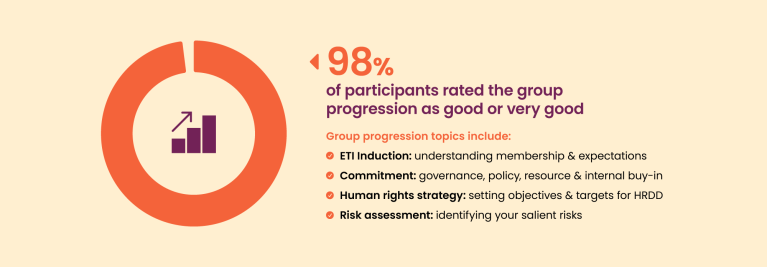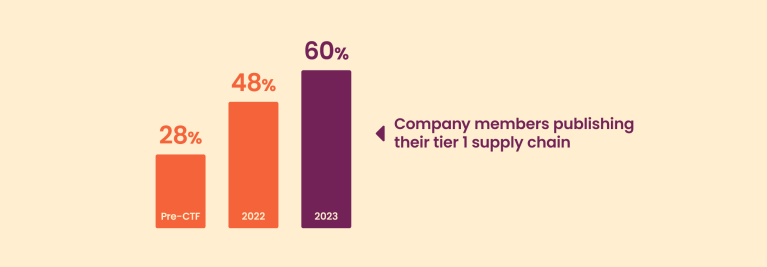
What a year for the business and human rights movement! As businesses navigate the complex world of supply chains and increasing regulatory requirements, one thing’s abundantly clear: human rights due diligence (HRDD) is no longer optional.
The expectation to protect workers’ rights, ensure transparency, and demonstrate genuine progress has never been greater.
But it’s also increasingly clear that ‘paper-based compliance’ simply isn’t enough to create meaningful change. That's where the Ethical Trading Initiative (ETI) and its members work to make a difference. ETI is a forward-thinking coalition dedicated to genuinely advancing human rights in global supply chains. We do this by helping companies to adopt a proactive, comprehensive HRDD approach, and by enabling tripartite collaboration – between companies, trade unions and NGOs – to address key human rights challenges.
As 2024 draws to a close, here are five things to celebrate and anticipate ahead of a new year at ETI:
1.Going beyond compliance
Growing emphasis on HRDD in legislation presents a pivotal moment for business and human rights. Governments worldwide are recognising the need for businesses to engage in proactive human rights due diligence. ETI is at the forefront of this shift, helping companies understand and implement HRDD practices that meet legal requirements and go beyond compliance by fostering improved transparency, accountability, and meaningful stakeholder engagement.
What we've been doing:
- Providing comprehensive HRDD workshops and practical guidance to our members through our group progression model and range of initiatives aimed at addressing key issues.

- Offering insights into various HRDD legislations and helping businesses interpret and apply them effectively.
What’s to come:
- Providing guidance to companies on meaningful stakeholder engagement strategies and its role within HRDD.
- Driving consultation on a framework for effective meaningful stakeholder engagement, to support businesses in practical implementation.
2. Advancing public transparency
Transparency is a key component of effective HRDD. ETI is leading the way in promoting public transparency across supply chains, especially as it relates to tier one suppliers.
What we've been doing:
- Prompting and supporting company members’ to improve their public reporting on supply chains and HRDD practices, in line with ETI’s Company Transparency Framework (CTF). This enables open scrutiny and helps companies demonstrate progress and build trust with consumers and stakeholders.
- Publishing the CTF and partnering with the Open Supply Hub - becoming the first multistakeholder initiative to mandate publication of tier one suppliers directly on the platform.

What’s to come:
- Completing the journey to help company members publicly report on their performance against the CTF’s minimum transparency requirements.
- Expanding our collaboration with OSH to increase the platform’s effectiveness, including encouraging wider NGO and trade union use to drive more significant, meaningful collaboration.
3. Driving responsible purchasing practices
A company’s everyday purchasing practices have significant influence on the conditions for workers in the supply chain and can be both the cause and the solution to many human rights issues. But it’s complex. ETI works with companies to understand and implement responsible purchasing practices that prioritise workers’ rights while maintaining business sustainability.
What we've been doing:
- Providing companies with the tools and knowledge they need to implement responsible purchasing practices that benefit both workers and suppliers. This includes supporting practical improvements with apparel and textile companies through the Learning and Implementation Community, developing a new Common Framework for Food, and exploring the applicability of the CFRPP in manufacturing, in collaboration with the German Development Cooperation (GIZ).
What’s to come:
- Continued focus on helping businesses protect and advance workers' rights, ensuring that profit goals don’t come at the expense of human dignity.
4. Addressing Climate Change’s impact on workers
Climate change poses significant risks to both people and business operations. ETI supports companies in understanding how human rights and climate change combine, and what to do to address both the impacts of the wider crisis, and how to ensure a company’s own adaptation supports a strengthening of workers’ rights, such as in new emerging industries.
What we've been doing:
- Working with members to involve workers in a just transition to a greener economy, through green social dialogue and mature industrial relations.
- Developing guidance on how businesses can address the human rights impacts of climate change in their supply chains. Starting with extreme heat.
What’s to come:
- Increased focus on how businesses can align their climate goals with human rights objectives, ensuring that climate action benefits both the environment and workers.
- Further guidance on the human rights impacts of climate change issues, including floods and water scarcity.
5.Responding to Crises and Challenging Contexts
Conflict, climatic events, political instability and types of crises can have detrimental impacts on human rights and present complications for responsible business conduct. ETI has been proactive in this area, supporting companies responding to crises and challenging contexts.
What we've been doing:
- Convening members to understand risks to human rights and responsible business conduct in response to emerging crises and within challenging contexts; including Bangladesh, the Middle East and Myanmar.
- Providing practical guidance and recommendations on responsible purchasing practices during crises and collaborating with joint ETIs to share practical examples on how to manage human rights risks in line with the UNGPs and OECD guidelines.
What’s to come:
- Continuing to offer crisis response tools and frameworks, ensuring that businesses are equipped to act swiftly and responsibly when unforeseen challenges arise.
Looking to 2025
Next year, ETI will also be developing, consulting on, and finalising our upcoming strategy. This will set our direction for the next five years. We look forward to working with organisations across our tripartite membership and forging a path for 2027-2032.
While the regulatory landscape around HRDD is evolving, it’s important to acknowledge the potential unintended consequences of regulatory measures. For example, if companies focus only on meeting the reporting and data requirements from new legislation, they will fall back on addressing the issues themselves and fail to meet the parts of legislation that require meaningful stakeholder engagement. This is why genuine action based on direct engagement with rights-holders and other stakeholders is paramount.
At ETI, we believe that true change can only happen when companies work collaboratively with stakeholders - including workers themselves, their representatives and NGOs - to create solutions that are both effective and sustainable. Our unique tripartite membership model enables us to engage a wide range of perspectives and ensure that our approach remains rooted in the realities of those most affected by human rights violations.
As we celebrate the progress made this year and anticipate the challenges ahead, ETI remains committed to helping businesses not just comply with legislation but lead the way in adopting a comprehensive, credible and impactful HRDD approach that protects workers' rights and drives systemic change across global supply chains. The journey is ongoing, but together, we can create a future where human rights are respected, protected, and upheld for all.
